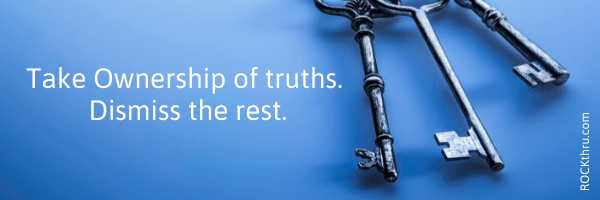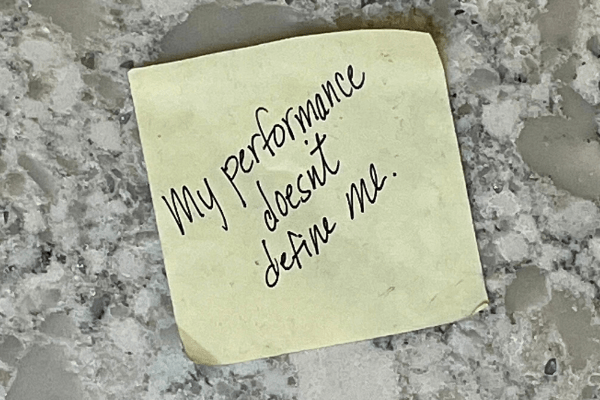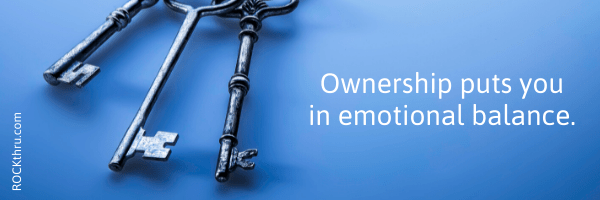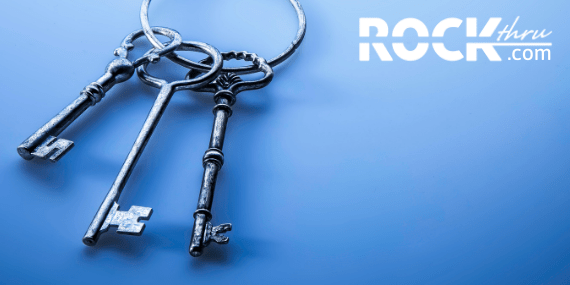
There was a time that I was frantically searching for the keys for happiness. Not too unlike when I am rushing out the door and desperate to put my hands on my car keys. I misplace my key ring several times a week; just ask anyone in my family, and they will eagerly confirm. I’m often asking myself, “Which part of my handbag did they land in when I hurriedly tossed them in? Which coat pocket did I put them in? Crap…which coat are they in?”
I wish this weren’t true, but one particularly hectic morning, when I had some really heavy things weighing on me, I was looking everywhere for my keys. After looking in the same places several times I finally remembered that my keys were in my running car that I had started ten minutes before to warm up during a snowstorm. Ugggh. “Really, Lee? I mean who does this? This time was a classic, you’re so stupid!” is the CliffNotes version of the self-talk that reeled through my head.
Since that day, I haven’t searched for keys that are in my running car. However, if I ever do that again, I’ll give myself a much more productive and supportive response. A kinder self-narrative is just one of the benefits of embedding the tenant of Ownership into my daily life. Ownership is one of the pillars of the R.O.C.K. acronym that I use to guide my choices: Respect, Ownership, Connection, and Kindness. Let’s break the Ownership principle down into three manageable keys for happiness so you can unlock the life you want.
The Ownership pillar holds the keys for happiness
When the ROCK principles first began to unfold for me, Ownership was the most elusive. I grappled tenaciously with this concept during my “big bucket of lemons journey.” This is how I lovingly refer to the time where the weight of the lemons in my life was too heavy for me to deal with using my usual, “artificial life sweetener” coping mechanism arsenal. After several years of sorting things out, I was finally able to embrace this definition of Ownership that emerged: Ownership is awareness, acceptance, and action based on truths. The epiphany came when I finally figured it out. All of the “three A’s” were integral keys for unlocking my happiness.
First, let’s talk about truths

The cornerstone of the Ownership principle is the “truths”. These are the parts of your life or your situations that are in accordance with fact or reality. Truths seem simple enough to identify, but I found them difficult to even see let alone call them out. My truths were behind a thick fog of insecurities and well-honed, unhealthy coping techniques. I was so good at functioning in the haziness of fear that the behaviors of perfectionism and busyness began to become my external personality. Praise and approval from others made me forget that I was not created to over commit myself and obsess about every detail. Joy appeared as occasional moments, more the exception than the rule. The longer I existed this way, the further hidden my genuine being became. I was missing my real self. Here is how the three keys for happiness helped me find and reclaim her again.
Key for happiness #1: Awareness
The lack of awareness of the truths of my life is what made the principle of Ownership so difficult to recognize and adopt. I had been programmed since birth about what I should and shouldn’t do. The behaviors of successful people. The definition of success itself. What was necessary to pay the rent and put food on the table. I was a product of the Midwestern “nose to the grindstone” philosophy.
It was being misled by the little lies I would believe and then incessantly replay them in my mind. A few of the heaviest anchors:
- My value is equal to my performance
- The more you have, the happier you will be
- To be accepted and successful you need to look the part
Finally, my heart was so buried in the cumulative lies it was unrecognizable and desperate to be seen. But, rough times have a way of ripping the veil of lies right off. When devastating diagnoses and challenging family issues sent me to rock bottom, the unstable foundation that the lies had created became all too clear.
Key for happiness #2: Acceptance
I quickly discovered that logical knowing and deep believing are two very different things. Although becoming aware of these worldly lies was eye opening, sitting with them long enough to do something about it was an entirely different story. Accepting that I had lived with these slippery lies as my foundation would mean accepting a long trail of unconscious disingenuousness. This felt like I was admitting that I was wrong and it paralyzed me. This flew straight in the face of my longtime companion, perfectionism. It was like seeing a horrific car accident. You can’t unsee it. Then you have two choices; ignore it and keep driving forward or stop and do what you can to help.
I was at a crossroads. Either I accept these truths or I continue on the hamster wheel of “endless report card of accomplishments” as described in this Psychology Today article about perfectionism.
The secret to acceptance is to objectively assess why I had been leaning so far into my emotional crutches. And when I did, I was able to see how I was duped into the unceasing performance mentality and subsequent behavior. I discovered that I was driven by daily reminders that who I am doesn’t match up with the advertising-curated societal standards. Instead of being true to myself, I was listening to the constant barrage of “you’re not good enough” garbage that was streaming through my head. Now I had the choice, I could turn away from the truths or embrace them and carry on. I moved forward to the last of the three keys for happiness.
Key for happiness #3: Action
This is where the rubber meets the road and you actually do something about the situation you’re in. I needed to make an action plan to let go of my detrimental reliance on perfectionism, which is what I tackled first. I’d take on the issue of busyness later, but I decided that baby steps were the most doable strategy. After all, I needed to undo over 40 years of influence and habitual reactions. And, if I was being honest with myself, many of the other behaviors were entangled with perfectionism.
Of course, actions will depend on the situation and there is no wrong or right magical path forward. Here are a few actions I took to learn to live without the destructive lie of sacrificing myself for the perfection fallacy.
Action 1: Ground yourself with a truth statement
I created a single statement that I could use as a reminder and support. I began most days off with the statement for a solid intention. I recited it when I needed an immediate reminder to bring me back to the truth. Most importantly, I would read the tattered yellow sticky each of the countless times I traded joy for the false sense of acceptance through achievement. The truth that I wanted to believe and take consistent action on was this:
My performance doesn’t define me.

Below you can download a list of 40 empowering truth statements so you can find one that resonates with your own journey.
Action 2: Start Small
Some of you may find these examples utterly ridiculous. But I am here to tell you that these small actions were the most influential part of my journey. Each tiny demonstration of messiness, inconsistency, and randomness was a victory. Each triumph pointed the obvious out, “See, that wasn’t too bad. Nothing at all negative happened when you mixed the black clothes hangers with the white ones.” I would tentatively try other things that felt equally as daring like leaving the pillows on my couch strewn or going to bed with a sink full of dishes when I was exhausted from the day.
It actually began to feel fun and even rebellious. When I didn’t turn my pajama shirts right-side out when I folded laundry, I felt an enormous sense of freedom. Then, when I actually wore them inside-out it was like giving the joy-stealing universe that I had created for myself the almighty double middle finger. These were the baby steps that helped me begin to experience just how much happiness and time perfectionism was sucking from each day.
Action 3: Take a Courageous Step
Only after surviving these tiny tests was I emotionally and physically prepared to move on to the more consequential behaviors. I had to feel the benefit before I could commit to being more ballsy. At work I began to embrace the 80/20 rule and get projects done faster. After already working an extra hour, I was much more easily able to close my laptop and profess that tomorrow is another day. I was able to make smart prioritization with my time and energy instead of acting as if all tasks were equal. I was eventually able to look perfection straight in the eyes and ask, “Who will really benefit from this over-achieving action that has served up?” Almost always the reply was, “No one will benefit from you being sacrificed.” “Yeah, that’s what I thought!” I would think as I imagined my demon slinking away, ears down and tail between its legs.
I was beginning to understand that taking action to live my truth was a more beautiful, more authentic way of living. I was becoming brave enough to be me and protect myself from unnecessary burn out. It also experienced the unexpected freedom of authenticity with others. When I was late to meet a friend for lunch, I could more easily say, “I am late because I have this terrible habit of trying to squeeze just one more thing in before I head out. I’m trying to get better at that, thanks for waiting for me.” (Side note: Notice that I didn’t say, “I’m so sorry I’m late. “I’m such a bad friend.” a lesson learned from the book “Girl, Stop Apologizing” written by Rachel Hollis. Check it out if you are struggling with not being “enough.”)
How the 3 keys for happiness unlocked my life
Before taking Ownership by using the three A’s, I was unknowingly driven by fear of rejection. Once I began to make consistent strides of Ownership in this area, I was conscious and empowered. The tiny little things that I did “wrong” each day weren’t actually “wrong” at all. And, they don’t define me as a __________ person. (Fill in the blank with any one of the nasty adjectives that we weigh ourselves down with: stupid, chaotic, ugly, unlikeable, untalented, unworthy, etc…) My breakthrough takeaway was that imperfection only defines me if I own it as a character flaw.
Let’s come full circle and go back to the missing keys example. Ownership of the truths along with the strength to ditch the lies put me in a productive mental position which sounds more like this:
“Lee, you suck at keeping track of your keys. It doesn’t make you an idiot, but hunting for them does waste a lot of time and adds stress to your day. Maybe you can try to consciously put them in the same pocket of your handbag each time you are done with them. Good luck, I’ll be rooting for you!”
Now that I can recognize the little “wrongs” as mere mistakes, as simply being human. I’ve even come to identify them as being perfectly imperfect. Giving myself compassion, noting opportunities for growth, and moving on is as empowering as it gets.
The benefit of balance

Ownership puts you in emotional balance. You’re not puffing yourself up with the “good” stuff to inflate your self-worth. Nor are you stuffing down the “bad” parts that actually need some attention. Living with the principle of Ownership at the forefront of my awareness, acceptance, and actions, I have found the keys for happiness and have applied Ownership to many different scenarios. The more times I choose to take the path of Ownership, the fewer times I lose the keys for happiness. It has been a pivotal way to approach life. I still mess up, in big and little ways every day, all day. But now, the difference is how I identify with the errors and react.
Now that this principle is embedded in my everyday life, l intentionally take Ownership of what is true and dismiss what is not. In the scenario with the keys in my running car, my narrative now sounds more beneficial and solution-orientated, “Lee, those keys are certainly your nemesis. You’ve clearly got a lot on your mind today, so give yourself a break. Times like this are a good reminder to slow down and be more in the moment.” This is a much more realistic and loving way to approach life, don’t you think?
Ownership helps me to ROCK thru life, and I hope it does the same for you. Your experiences inspire me and other ROCKers to grow. Feel free to comment here on or on social media on how you apply or want to begin taking Ownership of aspects of your life.
In the meantime thanks for being on this ROCK thru journey with me! XO ~Lee
Want more Inspiration to ROCK thru life?
Follow on Social Media for Weekly Updates:
Go Deeper into Each Principle:
Respect
Ownership
Connection
Kindness
Let’s Discuss
When we share with each other, we all learn and grow. Use the area below as a forum to go deeper. Provide your input. Start a conversation. Share your experience or perspective.
Please comment with Respect and Kindness. For more information, review the Guidelines for Discussion.

